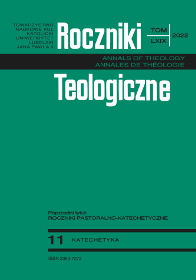Duchowe obejście: jak diagnozować i uczestniczyć w różnych formach niedojrzałości duchowej w pracy duszpasterskiej
Abstrakt
Od wieków rozwój duchowy jest jednym z głównych tematów teologii. W tym kontekście przewodnicy duchowi pomagali ludziom dostrzegać fałszywe drogi do Boga, takie jak unikanie koniecznego oczyszczenia intencji czy konieczność zmiany nawyków. Dziś jesteśmy świadkami rosnącego zainteresowania duchowością czy też rozwijania potencjału duchowego w życiu człowieka. Coraz większa liczba osób oddająca się bardziej zaawansowanym praktykom duchowym przekłada się na rosnącą możliwość obierania duchowych dróg na skróty. Ostatnio ten temat stał się również przedmiotem zainteresowania psychologii religii i duchowości. Niniejszy artykuł przedstawia główne wnioski z badań prowadzonych w zakresie tych nauk i omawia ich znaczenie dla pracy duszpasterskiej.
Bibliografia
Bernstein, Jerome. Living in the Borderland. London: Routledge, 2005.
Cashwell, Craig S. “Spirituality and wellness.” In Counseling for Wellness: Theory, Research, and Practice. Eds. Jane E. Myers, Thomas J. Sweeney, 197–206. Washington, DC: American Counseling Association, 2005.
Cashwell, Craig S., Harriet L. Glosoff, and Chereé Hammond. “Spiritual Bypass: A Preliminary Investigation.” Counseling and Values 54 (2010), 2: 162–174.
Cashwell, Craig S., Jane E. Myers, and W. Matthew Shurts. “Using the Developmental Counseling and Therapy Model to Work With a Client in Spiritual Bypass: Some Preliminary Considerations.” Journal of Counseling and Development 82 (2004), 4: 403–409.
Cashwell, Craig S., Paige B. Bentley, and J. Preston Yarborough. “The Only Way Out is Through: The Peril of Spiritual Bypass.” Counseling and Values 51 (2007), 2: 139–148.
Cashwell, Craig S., Philip B. Clarke, and Elizabeth G. Graves. “Step by Step: Avoiding Spiritual Bypass in 12-Step Work.” Journal of Addictions & Offender Counseling 30 (2009), 1: 37–48.
Cataldo, Lisa M. “Can There Be a Psychoanalytic Spirituality? A Response to Kenneth Porter.” Psychoanalytic Perspectives 10 (2013), 2: 270–784.
Chmielewski, Marek. Wielka księga duchowości katolickiej. Kraków: Wydawnictwo AA, 2015.
Clarke, Philip B., Amanda L. Giordano, Craig S. Cashwell, and Todd F. Lewis. “The Straight Path to Healing: Using Motivational Interviewing to Address Spiritual Bypass.” Journal of Counseling and Development 91 (2013), 1: 87–94.
Finley, James. Christian Meditation: Experiencing the Presence of God. San Francisco: Harper Collins, 2005.
Forman, Mark. A Guide to Integral Psychotherapy: Complexity, Spirituality, and Integration in Practice. Albany: State University of New York Press, 2010.
Fox, Jesse, Craig S. Cashwell, and Gabriela Picciotto. “The Opiate of the Masses: Measuring Spiritual Bypass and Its Relationship to Spirituality, Religion, Mindfulness, Psychological Distress, and Personality.” Spirituality in Clinical Practice 4 (2017), 4: 274–278.
Fox, Jesse, and Gabriela Picciotto. “The Mediating Effects of Spiritual Bypass on Depression, Anxiety, and Stress.” Counseling and Values 64 (2019), 2: 227–245.
Fox, Jesse, Gabriela Picciotto, Craig S. Cashwell, Everett L. Worthington, Melissa J. Basso, Sarah Brow Corrigan, Loren Toussaint, and Melissa Zeligman. “Religious Commitment, Spirituality, and Attitudes Toward God as Related to Psychological and Medical Help-Seeking: The Role of Spiritual Bypass.” Spirituality in Clinical Practice 7 (2020), 3: 178–196.
Frankl, Victor E. Man's Search for Meaning. Boston: Beacon Press, 2006.
Griffith, James L., Melissa Griffith. Encountering the Sacred in Psychotherapy. New York: The Guilford Press, 2003.
Grün, Anselm. O duchowości inaczej. Kraków: Wydawnictwo WAM, 1996.
Grzywocz, Krzysztof. Patologia duchowości. Kraków: Wydawnictwo WAM, 2020.
Hill, Peter C., and Marcus K. Kilian. “Assessing Clinically Significant Religious Impairment in Clients: Applications from Measures in the Psychology of Religion and Spirituality.” Mental Health, Religion & Culture 6 (2003), 2: 149–160.
Masters, Robert. A. Spiritual Bypassing: When Spirituality Disconnects us from what Really Matters. Berkeley, CA: North Atlantic Books, 2010.
May, Gerlad G. Will and Spirit. A Contemplative Psychology. New York: HarperCollins, 1987.
Niewiadomska, Iwona. „Mechanizmy obronne.” In Leksykon duchowości katolickiej, ed. Marek Chmielewski, 500-501. Kraków: Wydawnictwo „M”, 2002.
Pargament, Kenneth I., Joseph Kennell, William Hathaway, Nancy Grevengoed, Jon Newman, and Wendy Jones. “Religion and the Problem-Solving Process: Three Styles of Coping.” Journal for the Scientific Study of Religion 27 (1988), 1: 90–104.
Picciotto, Gabriela, and Jesse Fox. “Exploring Experts’ Perspectives on Spiritual Bypass: A Conventional Content Analysis.” Pastoral Psychology 67 (2017), 1: 65–84.
Picciotto, Gabriela, Jesse Fox, and Félix Neto. “A Phenomenology of Spiritual Bypass: Causes, Consequences, and Implications.” Journal of Spirituality in Mental Health 20 (2018), 4: 333–354.
Posacki, Antoni. Ezoteryzm i okultyzm – formy dawne i nowe. Radom: Polskie Wydawnictwo Encyklopedyczne, 2009.
Rybicki, Adam. Uzdrawiająca moc Maryi. Kraków: Wydawnictwo „M”, 2012.
Sheen, Fulton J. Droga do pokoju serca. Częstochowa: Edycja Świętego Pawła, 2011.
Weigel, George. Katolicyzm ewangeliczny. Kraków: Wydawnictwo „M”, 2014.
Welwood, John. “Principles of Inner Work: Psychological and Spiritual.” The Journal of Transpersonal Psychology 16 (1984), 1: 63-73.
Whitfield, Charles. My Recovery: A Personal Plan for Healing. Boca Raton, FL: Health Communications, 2003.
Zarzycki, Stanisław T. “Medytacja.” In Leksykon duchowości katolickiej, ed. Marek Chmielewski, 515. Kraków: Wydawnictwo „M”, 2002.
Copyright (c) 2022 Roczniki Teologiczne

Utwór dostępny jest na licencji Creative Commons Uznanie autorstwa – Użycie niekomercyjne – Bez utworów zależnych 4.0 Międzynarodowe.





